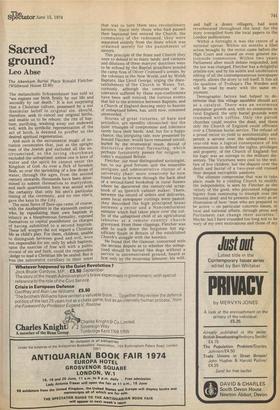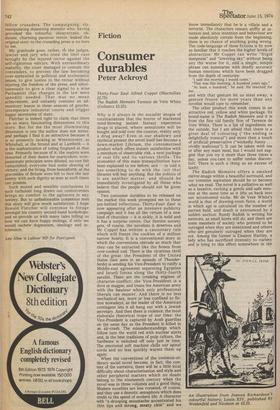Sacred ground?
Leo Abse
The Akenham Burial Place Ronald Fletcher (Wildwood House £3.95)
The melancholic Schopenhauer has told us "we expiate our birth firstly by our life and secondly by our death." It is not surprising that a Christian culture, possessed by a not dissimilar belief in original sin, should, therefore, seek to cancel our original births, and enable us to be reborn: the rite of baptism, purifying, washing away our endowed evil, with its symbolic representation of the act of birth, is deemed to proffer us the desired spiritual regeneration. And such is the sacramental magic of initiation ceremonies that, just as the upright men of the Jewish god excluded all the uncircumcised, so the loving churchman excluded the unbaptised: unless one is born of water and the spirit he cannot enter the Kingdom of God. As over a flick of foreskin flesh, so over the sprinkling of a few drops of water, through the ages, from the second century onwards, thousands have been determined to submit themselves to martyrdom; and each quarrelsome hero was seized with the certainty that only his sect's particular timing of the ceremony, and no one else's, gave the keys to the City. The most fierce of flare-ups came, of course, with the Anabaptists in the sixteenth century who, by repudiating their own baptism in infancy as a blasphemous formality, exposed themselves to capital punishment on charges of having submitted to a second baptism. These left wingers did not regard a Christian life as child's play. For them, children, unable to distinguish between good and evil, were not responsible for sin: only by adult baptism, Upon the exercise of free will with a public avowal of sin and faith, could the responsible dledge to lead a Christian life be sealed. But It Was the subversive corollary to their tenet that was to turn them into revolutionary heretics. Since only those who had passed their baptismal test entered the Church, the community of the redeemed, they were separated entirely from the State which was ordained merely for the punishment of sinners.
This principle of the State and Church they were to defend in so many lands: and variants and dilutions of these martyrs' doctrines were to be echoed by the Baptist preachers around the camp fires of Oliver Cromwell's armies, by the colonists in the New World, and by Welsh Baptists, like Lloyd George, urging the disestablishment of the Church in Wales. Yet, curiously, although the centuries of in tolerance suffered by these non-conformists have been well noticed, the Curious events that led to the armistice between Baptists, and a Church of England denying entry to heaven of unbaptised babes, has, until now, remained unrecorded.
Stories of great victories, of hate and prejudice, are speedily chronicled: but the quiet triumphs of compromise and tolerance rarely have their bards. And, but for a happy chance, this intriguing tale, now presented by Ronald Fletcher; would have remained untold, buried by the ecumenical mush, devoid of distinctive doctrinal flavouring, which perhaps fortunately passes for religion in today's mainland Britain.
Fletcher, our most distinguished sociologist, has, to our good fortune, quit the miserable intrigues and administrative clutter of a university chair: more creatively he now found time to browse through the back shed of a second-hand bookshop in rural Sussex where he discovered the century-old scrapbook of an Ipswich cabinet maker. There, between the record of orders and deliveries, some local newspaper cuttings were pasted: they described the high principled brawl between a rector and a Noncomformist minister which had taken place over the coffin of the unbaptised child of an agricultural labourer at a remote country church graveyard. From these clippings, Fletcher was able to track down the forgotten but significant finale in Britain of the established Church's struggle with the heretics.
He found that the clamour, concerned with the ancient dispute as to whether the unbaptised should be buried like dogs without a service in unconsecrated ground, heard. at first only by the mourning labourer, his wife,
• and half a dozen villagers, had soon reverberated throughout the land: for the story overspilled from the local papers to the London publications.
Within a fortnight it was the centre of a national uproar. Within six months a libel action brought by the rector came before the High Court and caused an even greater nationwide commotion. Within two years Parliament after much debate responded, and the law was changed. Fletcher has a delightful pristine eye, and by his subtle and unobtrusive editing of all the contemporaneous newspaper reports, allows the story to tell itself. It has all the qualities of Trollope's The Warden and will be read by many with the same enjoyment.
Demographic factors had helped to determine that this village squabble should act as a catalyst. There was an enormous population growth and, with no cemeteries in rural England, the only burial grounds were crammed with coffins. Only the parish churches could receive the dead, and there only the Church of England could officiate over a Christian burial service. The refusal of a proud rector to yield to sentimentality and permit a service over the unbaptised twoyear-old was a logical consequence of his determination to defend the rights, privileges and property, of the Church of England: but his logic was an outrage to the militant dissenters. The Victorians were cool to the welfare of live children, but the dispute over the death and burial of a two-year-old roused their deepest necrophilic passions.
The ultimate compromise that was to take place, made by a yielding Church to mollify the independents, is seen by Fletcher as the victory of the good, who prevented religious bigotry from continuing to triumph over the innocent dead: and he presents the story as an illustration of how "men who are prepared to be active — on particular concrete issues, in local and national affairs, through press and Parliament can change their societies." Maybe: but I have crusaded too long not to be wary of my own motivations and those of my fellow crusaders. The campaigning, sly, manipulating dissenting minister who, having provoked the colourful, idiosyncratic, obdurate, charming paranoic rector, leaked the original story to the crusading press is no hero to me.
My gratitude goes, rather, tb the judges, lawyer and jury who tried the libel case
brought by the injured rector against the self-righteous editors. With extraordinary maturity, the court managed to contain the contenders, to prevent the law becoming over-embroiled in political and ecclesiastic issues, to give justice to the rector without injuring the freedom of the press, and simul taneously to give a clear signal to a wise Parliament that changes in the law were speedily needed. That was no mean achievement, and certainly contains an admonitory lesson in these seasons of gauche, intemperate industrial courts and trigger happy secretaries of state.
Fletcher is indeed right to claim that there are so many fascinating dimensions to this story. But for me the most illuminating dimension is one the author does not stress: and perhaps I find it so attractive because it is so presently lacking at Westminster, at Whitehall, at the Strand and at Lambeth — it is the sophistication of ruling England at that time. Primarily because of it, the zealots were thwarted of their desire for martyrdom, overpassionate principles were diluted, no-one felt vanquished, everyone had some sharing of victory, and the living, from henceforth, at the gravesides of Britain were left to face the last enemy with such dignity as man at such times can possess.
Such muted and sensible conclusions to such turbulent long drawn out controversies brings no comfort to the agitators in any society. But to unfashionable consensus men this story will give much satisfaction. I hope Ronald Fletcher will continue to forage amongst his country second-hand bookshops: and so provide us with many tales telling us how we can have happy endings, if only we would eschew dogmatism, ideology and intolerance.



































 Previous page
Previous page